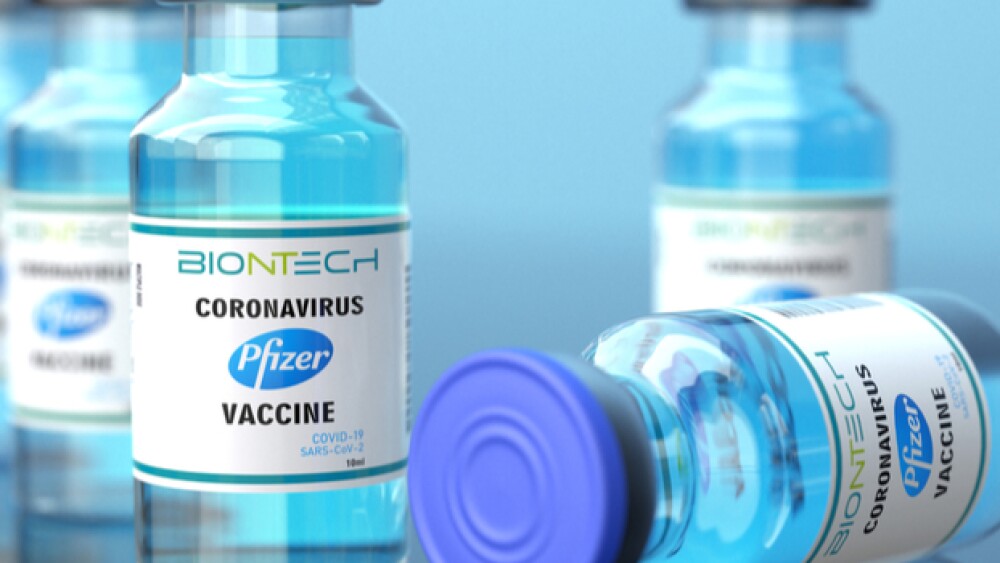A day after Pfizer and partner BioNTech submitted an EUA request to the FDA for their booster shot targeting Omicron variants BA.4 and BA.5, the regulator appears close to approving it.
Giovanni Cancemi / Shutterstock
A day after Pfizer and partner BioNTech submitted an emergency use authorization (EUA) request to the FDA for their booster shot targeting Omicron variants BA.4 and BA.5, the regulator appears close to approving it.
In an interview on Tuesday, Dr. Peter Marks, director of the FDA’s Center for Biologics Evaluation and Research (CBER) said the agency is “close to authorizing updated doses that would target the versions of the virus now circulating,” according to the New York Times.
While Marks would not discuss timing, the Times reported that the Biden administration plans to offer the booster to those ages 12 and up soon after Labor Day.
Pfizer and BioNTech announced the EUA submission Monday for a booster shot of their Omicron BA.4/BA.5-adapted bivalent COVID-19 booster. The request is for people 12 years and older. The companies have not conducted a clinical trial of this vaccine formulation. However, in preclinical studies, a booster dose demonstrated a neutralizing antibody response against Omicron BA.1, BA.2 and BA.4/BA.5 variants in addition to the original wild-type Wuhan strain. They expect to launch a clinical trial in people this month.
“Having rapidly scaled up production, we are positioned to immediately begin distribution of the bivalent Omicron BA.4/BA.5 boosters, if authorized, to help protect individuals and families as we prepare for potential fall and winter surges,” Albert Bourla, chairman and CEO of Pfizer, said.
Marks said the FDA has “extremely good” data showing that the vaccine is safe and effective, the Times reported.
Pfizer-BioNTech Vaccine 73.2% Effective in Kids Under Five
In a related story, Pfizer and BioNTech’s original vaccine formulation was 73.2% effective in kids six months to four years of age. The data was released two months after the U.S. rollout of the vaccine for that age group. The EUA was based on data in children five years and under that showed the shots created a similar immune response in older children.
Study: COVID-19 Variant Incubation Times are Lower
A study out of Peking University that analyzed 142 studies of 8,112 COVID-19 patients found that the incubation period of SARS-CoV-2 from Alpha to Omicron went from 5 to 3.4 days. The researchers define incubation time as the time from exposure to the virus to the time of first symptoms. The studies analyzed were published from Dec. 1, 2019, to Feb. 10, 2022.
The researchers also noted that COVID-19 seems to have a longer incubation period than other acute viral respiratory infections, including human coronavirus (3.2 days), influenza A (1.43 to 1.64 days), parainfluenza (cold, bronchitis, 2.6 days), respiratory syncytial virus (RSV, 4.4 days), rhinovirus (cold, sore throat, 1.4 days), and severe acute respiratory syndrome (SARS, 4.0 days).
COVID-19 Rules Led to Lower Norovirus Outbreaks
The cruise industry implemented strong vaccine and screening guidelines against COVID-19, with a positive side effect: far fewer outbreaks of gastrointestinal illness caused by noroviruses. To date, cruise lines have reported only two outbreaks of vomiting and diarrhea to the CDC that affected 3% or more of the ship’s passengers and crew. One was in May on a Carnival Cruise Line ship and another occurred late April through May on a Seabourn voyage.
The CDC told The Washington Post that the decline compared to pre-pandemic incidences could “most likely be attributed” to fewer people cruising and “nonpharmaceutical interventions used by cruise ships to mitigate COVID-19 transmission. These included increased cleaning and disinfection, increase in the number of hand sanitizer stations, crew served buffets and physical distancing.”
Fauci to Retire in December
After 38 years as director of the National Institute of Allergy and Infectious Diseases (NIAID), Anthony S. Fauci, M.D., plans to retire in December. Eighty-one years old, Fauci has advised seven U.S. presidents, starting with Ronald Reagan. He is currently also acting as President Joe Biden’s chief medical advisor.
“After more than 50 years of government service, I plan to pursue the next phase of my career while I still have so much energy and passion for my field,” Fauci said in a statement. “I want to use what I have learned as NIAID Director to continue to advance science and public health and to inspire and mentor the next generation of scientific leaders as they help prepare the world to face future infectious disease threats.”
Fauci joined the National Institutes of Health in 1968 at the age of 27. He assumed the position of director of NIAID in 1984.
Fauci became the face of the government’s efforts against COVID-19, becoming a familiar but occasionally controversial figure. He regularly sparred with Sen. Rand Paul (R-Ky.), whom Fauci accused of inciting death threats against him and his family.
Ron Klain, White House chief of staff, stated, “I cannot think of a public servant who has done as much to save as many lives for as long a period as Dr. Tony Fauci. And he is a gem of a person.”
CDC Expands Novavax EUA to Include Kids 12-17
The CDC recommended expanding the EUA for Novavax’s adjuvanted COVID-19 vaccine to include children 12 through 17. This is for a two-dose primary series. On Aug. 19, the FDA recommended the vaccine for this age group and the EUA was granted for adults 18 and older on July 13.
The Novavax vaccine uses a more traditional protein technology than the Pfizer-BioNTech and Moderna mRNA shots. The company was one of the original participants in Operation Warp Speed, the U.S. government’s program to accelerate vaccine development. But Novavax struggled with manufacturing problems and slower data readouts.





